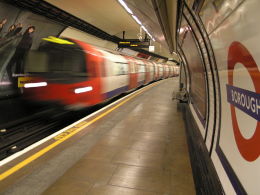Posted 15th October 2009 | No Comments
London Underground fares to rise by 3.9% in 2010

The Mayor of London has announced real terms increases in Transport for London fares from 2 January 2010, with the cost of Underground journeys set to rise by an average of 3.9%.
TfL's budget, already under siege, is being strained still further by the economic downturn. The Underground passenger total for August dropped by some 6% compared with a year earlier, although the network is still very busy in historical terms: the annual total topped 1bn for the first time ever earlier in this decade, after many years in which the typical annual figure was 600-700m.
Boris Johnson said he was asking Londoners to ‘to accept this difficult decision' in order to safeguard investment. He said no one wanted to make an announcement like this, especially as the capital was still feeling the effects of the recession, but the increases were necessary to counter the effects of the downturn and also the policies of the previous Mayor, Ken Livingstone. Mr Johnson explained: ‘The mistakes of the past and the current economic climate have conspired to present us with a huge challenge.’
INCREASES
The changes include an increase in the Zone 1 Underground fare, when paid by Oyster smartcard, from £1.60 to £1.80. The congestion charge will increase by £2 to £10, although a decision on abolishing the controversial western congestion charging zone has been deferred until the spring. Road passengers face sharper increases than those on the Underground: the cost of a bus or tram journey, again paid for by smartcard, will rise 20% from £1.00 to £1.20. Cash fares on all modes are often considerably higher, and the £4 fare for a single Underground journey involving six zones will rise from £4 to £4.50. Most other cash fares and Travelcard prices will be unchanged.
The watchdog London TravelWatch said the rises were unacceptable. LTW Chair Sharon Grant said: ‘We are particularly appalled at the 20% rise in single bus fares, and the rise of a single Oyster trip in zone 1. It appears that infrequent, irregular users, such as part-time workers, will be disproportionately punished. It is these people who may well decide not to use public transport, not travel at all, or use their car instead.’
There is also a possible straw in the wind with the complete withdrawal of the One Day Bus and Tram card ticket. TfL said: ‘The existing One Day Oyster price cap will provide an equivalent product.’ Although cash fares have been deliberately higher than the Oyster equivalents for several years, in order to encourage a switch to smartcards, this may be the first major TfL ticket to be scrapped altogether in hard copy form.
In spite of the rises in January, Transport for London said its general formula for fare increases in the years ahead would remain at RPI +2%.
TfL is also keeping a tight rein on expenditure where it can. Some station upgrades are likely to be deferred, and London Underground’s dispute with Public-Private Partnership contractor Tube Lines over the next Control Period has been referred to the PPP Arbiter.
